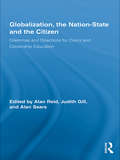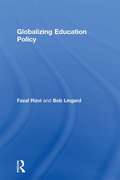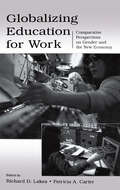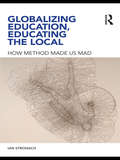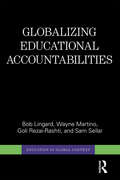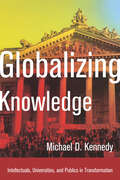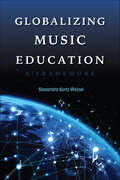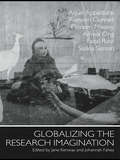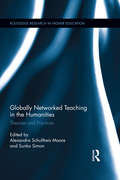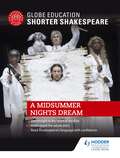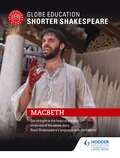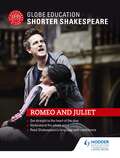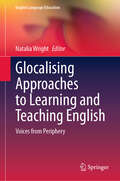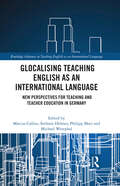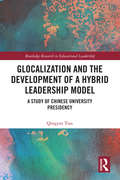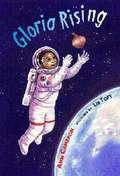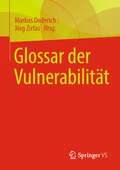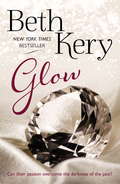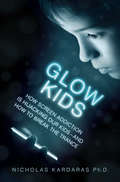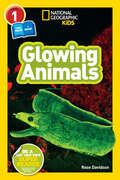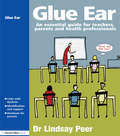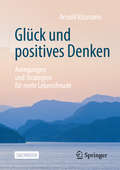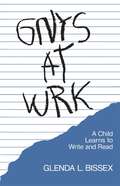- Table View
- List View
Globalization, the Nation-State and the Citizen: Dilemmas and Directions for Civics and Citizenship Education (Routledge Research in Education)
by Alan ReidThe past decade has seen an explosion of interest in civics and citizenship education. There have been unprecedented developments in citizenship education taking place in schools, adult education centers, or in the less formally structured spaces of media images and commentary around the world. This book provides an overview of the development of civics and citizenship education policy across a range of nation states. The contributors, all widely respected scholars in the field of civics and citizenship education, provide a thorough understanding of the different ways in which citizenship has been taken up by educators, governments and the wider public. Citizenship is never a single given, unproblematic concept, but rather its meanings have to be worked through and developed in terms of the particularities of socio-political location and history. This volume promotes a wider and more grounded understanding of the ways in which citizenship education is enacted across different nation states in order to develop education for active and participatory citizenry in both local and global contexts.
Globalizing Education Policy
by Fazal Rizvi Bob LingardRizvi and Lingard's account of the global politics of education is thoughtful, complex and compelling. It is the first really comprehensive discussion and analysis of global trends in education policy, their effects - structural and individual - and resistance to them. In the enormous body of writing on globalisation this book stands out and will become a basic text in education policy courses around the world. - Stephen J Ball, Karl Mannheim Professor of Sociology of Education, Institute of Education, University of London, UK In what ways have the processes of globalization reshaped the educational policy terrain? How might we analyse education policies located within this new terrain, which is at once local, national, regional and global? In Globalizing Education Policy, the authors explore the key global drivers of policy change in education, and suggest that these do not operate in the same way in all nation-states. They examine the transformative effects of globalization on the discursive terrain within which educational policies are developed and enacted, arguing that this terrain is increasingly informed by a range of neo-liberal precepts which have fundamentally changed the ways in which we think about educational governance. They also suggest that whilst in some countries these precepts are resisted, to some extent, they have nonetheless become hegemonic, and provide an overview of some critical issues in educational policy to which this hegemonic view of globalization has given rise, including: devolution and decentralization new forms of governance the balance between public and private funding of education access and equity and the education of girls curriculum particularly with respect to the teaching of English language and technology pedagogies and high stakes testing and the global trade in education. These issues are explored within the context of major shifts in global processes and ideological discourses currently being experienced, and negotiated by all countries. The book also provides an approach to education policy analysis in an age of globalization and will be of interest to those studying globalization and education policy across the social sciences.
Globalizing Education for Work: Comparative Perspectives on Gender and the New Economy (Sociocultural, Political, and Historical Studies in Education)
by Richard D. Lakes Patricia A. CarterThis book explores how changes in the new world economy are affecting the education of male and female workers. Authors from Australia, Africa, Brazil, Europe, North America, and South Korea use methodologies--such as literature reviews, case studies, legislative analysis, evaluations of model delivery systems, and demographic profiles--to examine the current efforts of a number of nations around the world to transform vocational education and training (VET) programs into gender equitable institutions where female students are able to obtain skills necessary for successful and economically viable lives. The cross-national perspectives in this volume illuminate the meaning of VET equity theory and practice in the new economy. Gender equity in education is constructed differently from place to place depending on a variety of factors, including economic development and cultural traditions. Starting from this understanding that gender and culture are multifaceted, historically situated, and constructed around dominant economic and institutional structures, class identities, and social positions, as well as discursive practices, the book addresses central questions, such as: *What roles do schools play in the global economy? *Is there a parallel between an increasingly globalized economy and a viable universal concept of education for work? *What is the effect of a nation's financial condition, political system, and global economic posture on its training policies? *Are educational equity issues heightened or submerged in the new economy? The comparative perspective helps readers to more clearly analyze both tensions that arise as capitalist changes in the new economy are contested, resisted, or accommodated--and the impact upon education. In the Afterword, the editors identify overarching themes emerging from the volume and illuminate various comparative perspectives on gender and the new economy. Globalizing Education for Work: Comparative Perspectives on Gender and the New Economy brings together important information and analysis for researchers, students, and teachers in education, women's studies, and sociology; for vocational education and training professionals; and for policymakers and policy analysts in governmental and nongovernmental organizations. It is well suited as a text for a range of graduate courses in the fields of comparative and international education, politics of education, vocational educational policy, gender and education, and sociology of education.
Globalizing Education, Educating the Local: How Method Made us Mad
by Ian StronachThis book offers a critical and deconstructive account of global discourses on education, arguing that these overblown ‘hypernarratives’ are neither economically, technically nor philosophically defensible. Nor even sane. Their ‘mythic economic instrumentalism’ mimic rather than meet the economic needs of global capitalism in ways that the Crash of 2008 brings into vivid disarray. They reduce national education to the same ‘hollowed out’ state as national capitalisms, subject to global pseudo-accountancy and fads. The book calls for a philosophical and methodological revolution, arguing for more transformative narratives that remodel qualitative inquiry, particularly in addressing a more performative rather than representative ideal. The first part of the book aims to critique, deconstruct and satirise contemporary assumptions about educational achievement and outputs, the nature of contemporary educational discourses, and the nature of the professionalism that sustain them. The second part offers innovative postmodernist ways of reconstructing a theory and methodology that aims at ‘educating the local’ rather than succumbing to the fantasies of the universal. This is a very timely book in that the economic crisis re-exposes the mythic nature of education-economic linkages, putting discourses prefaced on such ‘connections’ into parallel crisis. Our global educational discourses have also crashed, and new futures need urgently to be found. Such a ‘turnaround’ is both proposed and argued for. The book will appeal to a wide range of readers who are committed to educational and cultural change, and who are interested in a new politics of education. It will have an immediate relevance and appeal in the UK, USA, Australia and New Zealand in particular.
Globalizing Educational Accountabilities (Education in Global Context)
by Bob Lingard Wayne Martino Goli Rezai-Rashti Sam SellarGlobalizing Educational Accountabilities analyzes the influence that international and national testing and accountability regimes have on educational policy reform efforts in schooling systems around the world. Tracing the evolution of those regimes, with an emphasis on the OECD’s PISA, it reveals the multiple effects of policy as numbers in countries with different types of government and different education systems. From the effect of Shanghai’s PISA success on nations trying to compete economically to the perverse effects of linking funding to performance targets in Australia, the analysis links testing and accountability to new modes of network governance, new spatialities, and the significance of data infrastructures. This highly illustrative text offers scholars and policy makers a critical policy sociology framework for doing education policy analysis today.
Globalizing Knowledge: Intellectuals, Universities, and Publics in Transformation
by Michael D. KennedyHeralding a push for higher education to adopt a more global perspective, the term "globalizing knowledge" is today a popular catchphrase among academics and their circles. The complications and consequences of this desire for greater worldliness, however, are rarely considered critically. In this groundbreaking cultural-political sociology of knowledge and change, Michael D. Kennedy rearticulates questions, approaches, and case studies to clarify intellectuals' and institutions' responsibilities in a world defined by transformation and crisis. Globalizing Knowledge introduces the stakes of globalizing knowledge before examining how intellectuals and their institutions and networks shape and are shaped by globalization and world-historical events from 2001 through the uprisings of 2011–13. But Kennedy is not only concerned with elaborating how wisdom is maintained and transmitted, he also asks how we can recognize both interconnectedness and inequalities, and possibilities for more knowledgeable change within and beyond academic circles. Subsequent chapters are devoted to issues of public engagement, the importance of recognizing difference and the local's implication in the global, and the specific ways in which knowledge, images, and symbols are shared globally. Kennedy considers numerous case studies, from historical happenings in Poland, Kosova, Ukraine, and Afghanistan, to today's energy crisis, Pussy Riot, the Occupy Movement, and beyond, to illuminate how knowledge functions and might be used to affect good in the world.
Globalizing Music Education: A Framework (Counterpoints: Music and Education)
by Alexandra Kertz-WelzelHow do globalization and internationalization impact music education around the world? By acknowledging different cultural values and priorities, Alexandra Kertz-Welzel's vision challenges the current state of international music education and higher education, which has been dominated by English-language scholarship. Her framework utilizes an interdisciplinary approach and emphasizes the need for developing a pluralistic mode of thinking, while underlining shared foundations and goals. She explores issues of educational transfer, differences in academic discourses worldwide, and the concept of the global mindset to help facilitate much-needed transformations in global music education. This thinking and research, she argues, provides a means for better understanding global transfers of knowledge and ways to avoid culturally and linguistically hegemonic standards. Globalizing Music Education: A Framework is a timely call to action for a more conscious internationalization of music education in which everyone can play a part.
Globalizing the Research Imagination
by Jane Kenway Johannah FaheyIn the provocative opening essay Kenway and Fahey explore ways in which the notion of the imagination itself might be mobilized by researchers. They are encouraged to develop 'defiant' global imaginations and communities with the capacities to think, 'be' and 'become' differently in a world of research increasingly governed by rampant reductionist rationality. To support this view there follows a series of detailed interviews with some of the world's leading intellectuals where the editors explore what it might mean to globalize the research imagination. The interviewees, Arjun Appadurai, Raewyn Connell, Doreen Massey, Aihwa Ong, Fazal Rizvi and Saskia Sassen, are foremost in their research fields and their views related here are both influential and inspirational. This thought-provoking book for students and researchers identifies and critically interrogates the various ways in which globalization reshapes research investigates the challenges that globalization poses for the social sciences and humanities creates an understanding of how globalization is transforming the practice of research and doctoral research training Progressive researchers in the social sciences and humanities urgently need to decide for themselves how best to globalize research methodologies and communities, and this book will be an invaluable resource for them.
Globally Networked Teaching in the Humanities: Theories and Practices (Routledge Research in Higher Education)
by Alexandra Schultheis Moore Sunka SimonAs colleges and universities in North America increasingly identify "internationalization" as a key component of the institution’s mission and strategic plans, faculty and administrators are charged with finding innovative and cost-effective approaches to meet those goals. This volume provides an overview and concrete examples of globally-networked learning environments across the humanities from the perspective of all of their stakeholders: teachers, instructional designers, administrators and students. By addressing logistical, technical, pedagogical and intercultural aspects of globally-networked teaching, this volume offers a unique perspective on this form of curricular innovation through internationalization. It speaks directly to the ways in which new technologies and pedagogies can promote humanities-based learning for the future and with it the broader essential skills of intercultural sensitivity, communication and collaboration, and critical thinking.
Globe Education Shorter Shakespeare: A Midsummer Night's Dream
by Globe EducationExam Board: Non-SpecificLevel: KS3Subject: EnglishFirst Teaching: September 2015First Exam: Summer 2018Get straight to the heart of Shakespeare's A Midsummer Night's Dream; students' confidence and understanding develop faster as they explore the plot, themes and Shakespeare's language, which is supported throughout this abridged play text from Globe Education.This title:- Reduces the length of the play by a third, while preserving the intricacies of the plot, enabling students to engage with the whole story in the class time available- Builds understanding of Shakespeare's language by providing a detailed glossary alongside the text for quick and easy reference, plus a range of language-focused activities- Offers a tried-and-tested approach to introducing Shakespeare, based on Globe Education's shortened 'Playing Shakespeare' productions that have been seen and appreciated by over 150,000 students- Helps students form their own personal responses to Shakespeare's A Midsummer Night's Dream, stimulated by stunning photographs from Globe productions and questions that reflect on context, characters and themes- Lays the foundations for GCSE success by including activities that target the skills needed for the assessment objectivesFree teacher supportShorter Shakespeare: A Midsummer Night's Dream is supported by free online teaching resources for each scene:- Teaching notes with guidance on how to approach the scene - Practical group activities to use in the classroom- Questions on language, context, themes, character and performance - Web links to extra resources including photographs from Globe productions, interviews with actors and contextual informationThis title is also accompanied by 10 video clips from Globe Education's shortened 'Playing Shakespeare' production of A Midsummer Night's Dream.
Globe Education Shorter Shakespeare: Macbeth
by Globe EducationExam Board: AQA, Edexcel, OCR & WJECLevel: KS3Subject: EnglishFirst Teaching: September 2015First Exam: June 2018Get straight to the heart of Shakespeare's Macbeth; students' confidence and understanding develop faster as they explore the plot, themes and Shakespeare's language, which is supported throughout this abridged play text from Globe Education.This title:- Reduces the length of the play by a third, while preserving the intricacies of the plot, enabling students to engage with the whole story in the class time available- Builds understanding of Shakespeare's language by providing a detailed glossary alongside the text for quick and easy reference, plus a range of language-focused activities- Offers a tried-and-tested approach to introducing Shakespeare, based on Globe Education's shortened 'Playing Shakespeare' productions that have been seen and appreciated by over 150,000 students- Helps students form their own personal responses to Shakespeare's Macbeth, stimulated by stunning photographs from Globe productions and questions that reflect on context, characters and themes- Lays the foundations for GCSE success by including activities that target the skills needed for the assessment objectivesFree teacher supportShorter Shakespeare: Macbeth is supported by free online teaching resources for each scene:- Teaching notes with guidance on how to approach the scene - Practical group activities to use in the classroom- Questions on language, context, themes, character and performance - Web links to extra resources including photographs from Globe productions, interviews with actors and contextual informationThis title is also accompanied by 10 video clips from Globe Education's shortened 'Playing Shakespeare' production of Macbeth.
Globe Education Shorter Shakespeare: Romeo and Juliet
by Globe EducationExam Board: Non-SpecificLevel: KS3Subject: EnglishFirst Teaching: September 2015First Exam: Summer 2018Get straight to the heart of Shakespeare's Romeo and Juliet; students' confidence and understanding develop faster as they explore the plot, themes and Shakespeare's language, which is supported throughout this abridged play text from Globe Education.This title:- Reduces the length of the play by a third, while preserving the intricacies of the plot, enabling students to engage with the whole story in the class time available- Builds understanding of Shakespeare's language by providing a detailed glossary alongside the text for quick and easy reference, plus a range of language-focused activities- Offers a tried-and-tested approach to introducing Shakespeare, based on Globe Education's shortened 'Playing Shakespeare' productions that have been seen and appreciated by over 150,000 students- Helps students form their own personal responses to Shakespeare's Romeo and Juliet, stimulated by stunning photographs from Globe productions and questions that reflect on context, characters and themes- Lays the foundations for GCSE success by including activities that target the skills needed for the assessment objectivesFree teacher supportShorter Shakespeare: Romeo and Juliet is supported by free online teaching resources for each scene:- Teaching notes with guidance on how to approach the scene - Practical group activities to use in the classroom- Questions on language, context, themes, character and performance - Web links to extra resources including photographs from Globe productions, interviews with actors and contextual informationThis title is also accompanied by 10 video clips from Globe Education's shortened 'Playing Shakespeare' production of Romeo and Juliet.
Globetrotting or Global Citizenship?
by Robert Huish Rebecca TiessenGlobetrotting or Global Citizenship? explores the broad range of international experiential learning options available to Canadian students, as well as the opportunities and the ethical dilemmas that come with them. Combining practical advice with critical examinations of international experiential learning, this essay collection is designed to help the reader to move beyond photo-ops and travel opportunities and towards striving for a deeper global citizenship.Globetrotting or Global Citizenship? is a valuable guide for students considering going abroad for experiential learning and a useful resource for those returning from such programs, as well as instructors and administrators facilitating pre-departure and return orientation sessions. Anyone taking part in international volunteering will find the reflections and analysis provided here an excellent starting point for understanding the potential impact of their time abroad.
Glocalising Approaches to Learning and Teaching English: Voices from Periphery (English Language Education #41)
by Natalia WrightThis volume focuses on glocalization in English language teaching and learning, examining the challenges of its implementation. It describes the innovative practices of multilingual TESOL practitioners from various parts of the world, offering nuanced perspectives on how to glocalize teaching methods, curricula, materials, and teacher preparation. The chapters, spanning different levels of education, weave together theory and practice, highlighting strategies to successfully navigate the complex relationships between global demands and local needs in language teaching and learning. This edited book presents empirical research studies, which together provide the evidence-based knowledge necessary to effectively teach linguistically and culturally diverse students. Beyond academic discussion, this book serves as a practical guide for those involved in teacher preparation, offering strategies and practical applications of glocalized approaches to developing programs for pre-service educators. Above all, the book invites all language teaching professionals to embrace glocalization practices in response to the increasingly plurilingual and pluricultural world in which they operate.
Glocalising Teaching English as an International Language: New Perspectives for Teaching and Teacher Education in Germany (Routledge Advances in Teaching English as an International Language Series #3)
by Marcus CalliesThe worldwide spread, diversification, and globalization of the English language in the course of the 20th and early 21st centuries has significant implications for English Language Teaching and teacher education. We are currently witnessing a paradigm shift towards Teaching English as an International Language (TEIL) that aims to promote multilingualism and awareness of the diversity of Englishes, increase exposure to this diversity, embrace multiculturalism, and foster cross-cultural awareness. Numerous initiatives that embrace TEIL can be observed around the world, but ELT and teacher education in Germany (and other European countries) appear to be largely unaffected by this development, with standard British and American English and the monolingual native speaker (including the corresponding cultural norms) still being very much at the center of attention. The present volume addresses this gap and is the first of its kind to showcase recent initiatives that aim at introducing TEIL into ELT and teacher education in Germany, but which have applicability and impact for other countries with comparable education systems and ‘traditional’ ELT practices in the Expanding Circle. The chapters in this book provide a balanced mix of conceptual, empirical, and practical studies and offer the perspectives of the many stakeholders involved in various settings of English language education whose voices have not often been heard, i.e., students, university lecturers, trainee teachers, teacher educators, and in-service teachers. It therefore adds significantly to the limited amount of previous work on TEIL in Germany and bridges the gap between theory and practice that will not only be relevant for researchers, educators, and practitioners in English language education in Germany but other educational settings that are still unaffected by the shift towards TEIL.
Glocalization and the Development of a Hybrid Leadership Model: A Study of Chinese University Presidency (Routledge Research in Educational Leadership)
by Qingyan TianThrough in-depth interviews with the presidents of major Chinese universities, this text explores the changing demands on leaders in Higher Education in the wake of globalization, and develops a contemporary model of Hybrid Leadership. Glocalization and the Development of a Hybrid Leadership Model examines the leadership philosophies and practices of Chinese university presidents and presents new insights and perspectives on the meaning and practice of leadership in a global era. Drawing on data from a unique methodological process which integrates Western and Eastern approaches, chapters foreground the experiences of leaders in higher education to demonstrate how they perceive and balance diverse and potentially conflicting local and global demands, and ensure effective leadership by combining leadership philosophies and practices from local and global contexts. Ultimately, this informs the development of new model of leadership characterized by the hybridization of the global and local at the contextual and personal levels, and marked by global competency, multiple cultural and sectoral mindsets, and geographically adaptable skill sets. Challenging and enriching the existing theories of leadership for higher education, this text will be of interest to scholars, post-graduate students and academics in the fields of educational leadership, international and comparative education, higher education, and leadership studies. It will also be of interests to the practitioners of leadership in general and higher education leadership in particular.
Glooscap and the Baby: Independent Reading 12 (Reading Champion #513)
by Caroline WalkerThis story is part of Reading Champion, a series carefully linked to book bands to encourage independent reading skills, developed with Dr Sue Bodman and Glen Franklin of UCL Institute of Education (IOE). This book is aimed at Independent Reading 12, for readers aged 7 years old and up, or in the second half of Year 3.Glooscap is an undefeated and prized warrior, until he meets the unbeatable foe: a baby. In this traditional tale from the myths of the Wabanaki people (a Native American group of five nations), we learn about where true power lies.Reading Champion offers independent reading books for children to practise and reinforce their developing reading skills.Fantastic, original stories are accompanied by engaging artwork and a reading activity. Each book has been carefully graded so that it can be matched to a child's reading ability, encouraging reading for pleasure.The Key Stage 2 Reading Champion Books are suggested for use as follows:Independent Reading 11: start of Year 3 or age 7+Independent Reading 12: end of Year 3 or age 7+Independent Reading 13: start of Year 4 or age 8+Independent Reading 14: end of Year 4 or age 8+Independent Reading 15: start of Year 5 or age 9+Independent Reading 16: end of Year 5 or age 9+Independent Reading 17: start of Year 6 or age 10+Independent Reading 18: end of Year 6 or age 10+
Gloria Rising
by Ann CameronSometimes it's the little things that are really big, Gloria learns when her mom sends her to the grocery store for an onion. Because of the onion, she meets Dr. Grace Street, an astronaut. But how is she supposed to understand Dr. Street's advice that the big things are often not as big as they seem? Especially since it's only the beginning of fourth grade and already Gloria has enormous teacher troubles! The Dragon of Doom, a.k.a. Mrs. Yardley, doesn't seem to like Gloria, or anyone else for that matter-except for Billy Watkins, the class bully. Things go from bad to worse when Billy gets the whole class in trouble. Then a surprise visit from Dr. Street reminds Gloria that she knows how to rise above her difficulties. In this sincere and funny follow-up to Glorias Way, Gloria learns that a little self-confidence can help her accomplish big things.
Glossar der Vulnerabilität
by Jörg Zirfas Markus DederichDieses Glossar unternimmt den ersten Versuch, das semantische Feld des Begriffs ‚Vulnerabilität‘ einzugrenzen und die mit ihm verbundenen heterogenen Phänomene in ihren Überlappungen und Wechselwirkungen kenntlich zu machen. Das Glossar ist dabei an einem anthropologischen, phänomenologischen und pragmatischen Verständnis von Vulnerabilität orientiert. Dargestellt und analysiert werden Phänomene, Ursachen und Folgen unterschiedlicher Formen von Vulnerabilität aus unterschiedlichen disziplinären Zugängen. Neben der Vielschichtigkeit und Komplexität und neben den problematischen und positiven Momenten von Vulnerabilität kommen auch pädagogische Möglichkeiten zur Sprache, diese zu bewältigen und zu gestalten.
Glow (Glimmer and Glow Series)
by Beth KeryFor fans of E. L. James, Sylvia Day, Jodi Ellen Malpas, J. Kenner and Maya Banks. The New York Times bestselling author of the Because You Are Mine series and The Affair, returns to Alice and Dylan's heartstopping love affair in the sequel to Glimmer...Alice Reed never dreamed she'd escape the stigma of her past. Stunned to be handpicked by the CEO of Durand Enterprises, she was even more shocked to discover that Dylan Fall desired her for pleasure, as well as business... But their deliciously forbidden time together is shattered by a startling secret. The shadows of Alice's past are brutally surfacing, her true identity being revealed. It soon becomes clear that she's battling a mysterious enemy, intent on destroying her. Dylan will do anything to protect Alice. But as Alice falls helplessly in love, she's forced to question how deeply she can trust him. What secrets of her past is he hiding? And can their future survive the truth?Alice and Dylan's passionate, explosive romance began in Glimmer.For more electrifying romance, don't miss the other captivating titles by Beth Kery, The Affair, the One Night of Passion series, and her bestselling erotically charged series which began with Because You Are Mine.
Glow Kids: How Screen Addiction Is Hijacking Our Kids - and How to Break the Trance
by Nicholas KardarasWe've all seen them: kids hypnotically staring at glowing screens in restaurants, in playgrounds and in friends' houses--and the numbers are growing. Like a virtual scourge, the illuminated glowing faces--the Glow Kids--are multiplying. But at what cost? Is this just a harmless indulgence or fad like some sort of digital hula-hoop? Some say that glowing screens might even be good for kids--a form of interactive educational tool. Don't believe it. In Glow Kids, Dr. Nicholas Kardaras will examine how technology--more specifically, age-inappropriate screen tech, with all of its glowing ubiquity--has profoundly affected the brains of an entire generation. Brain imaging research is showing that stimulating glowing screens are as dopaminergic (dopamine activating) to the brain's pleasure center as sex. And a growing mountain of clinical research correlates screen tech with disorders like ADHD, addiction, anxiety, depression, increased aggression, and even psychosis. Most shocking of all, recent brain imaging studies conclusively show that excessive screen exposure can neurologically damage a young person's developing brain in the same way that cocaine addiction can. Kardaras will dive into the sociological, psychological, cultural, and economic factors involved in the global tech epidemic with one major goal: to explore the effect all of our wonderful shiny new technology is having on kids. Glow Kids also includes an opt-out letter and a "quiz" for parents in the back of the book.
Glowing Animals (Readers)
by Rose DavidsonYou know fireflies glow in the dark, but did you know there are many other animals that make their own light? Dive deep into the ocean, soar high in the sky, and explore the forest and desert floors to discover animals that glow.Explore the wonderful world of bioluminescence and biofluorescence in this National Geographic Kids Co-reader. Learn how and why animals emit light. Discover their incredible colors in stunning photography of eels, corals, frogs, and more. National Geographic Kids Readers have been a hit in the beginning reader category, and this book builds upon that success with a new approach--parents and children reading together. With the same combination of careful text, brilliant photographs, and fun approach to high-interest subjects that has proved to be a winning formula with kids, National Geographic Co-readers provide one page of adult read-aloud and one page of kid read-aloud text on each spread, building toward a collaborative reading experience.
Glue Ear: An essential guide for teachers, parents and health professionals
by Lindsay PeerGlue Ear is a common condition among young children but until recently its long-term effects on learning and achievement weren't fully understood. Lindsay's research has demonstrated that there is a significant link between Glue Ear, speech and language and dyslexia. This book will help teachers to understand the implications of temporary hearing loss, and demonstrate how to be proactive as well as reactive in tackling the issues. This book will also be helpful to health professionals who may be aware of the medical implications of Glue Ear but not the educational reverberations. A separate section for parents enables teachers/health visitors/GPs to access information to copy and give out to families.
Glück und positives Denken: Anregungen und Strategien für mehr Lebensfreude
by Arnold KitzmannDieses Sachbuch stellt verschiedene Strategien zur Steigerung des Glücks und der persönlichen Zufriedenheit vor. Positiv zu denken ist dabei ein wichtiger Weg, um die eigenen Chancen zu verbessern und ein höheres Maß an Lebensqualität zu erreichen. Der Autor zeigt, wie man Aktivität und Entspannung, neue Sichtweisen und bewährte Erfahrungen optimal miteinander verbindet. Das Buch trägt der Komplexität des Begriffs Glück durchgängig Rechnung, indem es das Thema aus verschiedenen Blickwinkeln betrachtet. Aus philosophischer, literarischer, lebenspraktischer und zwischenmenschlicher Sicht befasst es sich auch mit den Auswirkungen einer gewandelten Welt im Zeitalter von Digitalisierung und künstlicher Intelligenz. Lesende erhalten Anregungen für die eigene Lebensweise und sind dazu eingeladen, den wirklich wichtigen Werten im Leben nachzuspüren und herauszufinden, was sie glücklich macht.Das Buch richtet sich an Praktiker und Experten (Personalabteilung, Marketing, Vertrieb, Führung) ebenso wie an Leser, die allgemein am Thema Glück interessiert sind.
Gnys at Wrk: A Child Learns To Write And Read
by Glenda L. BissexAt age five, the author's son posted this sign over his workbench: DO NAT DSTRB GNYS AT WRK. The “work” from which he refused to be disturbed was typical for children—learning to read and write. Glenda Bissex goes beyond the chronicle of this accomplishment to provide the first in–depth case study of a child’s confrontation with written language.
